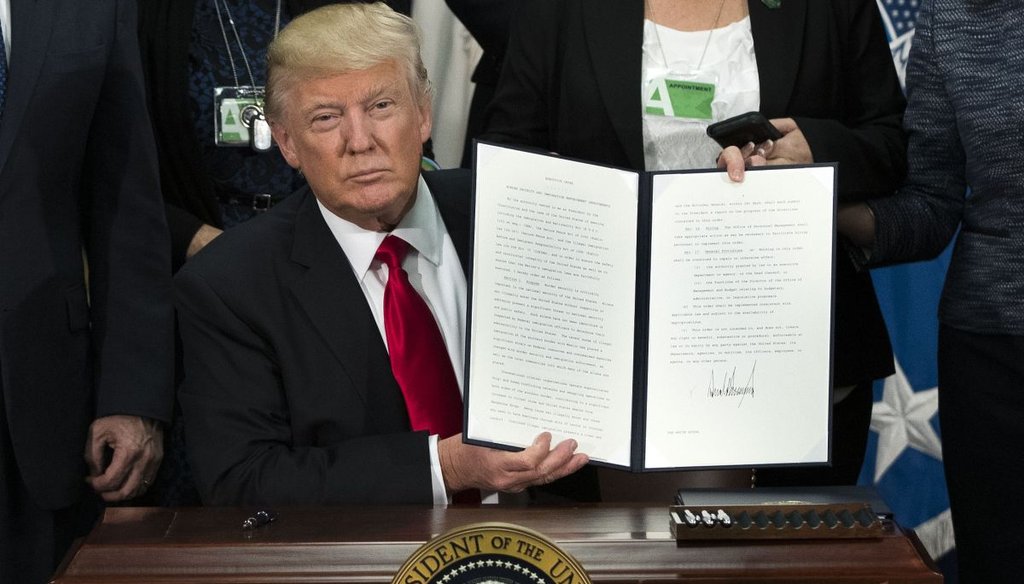Stand up for the facts!
Our only agenda is to publish the truth so you can be an informed participant in democracy.
We need your help.
I would like to contribute
Trump signs executive order temporarily banning immigrants from seven countries

President Donald Trump after signing an executive action that will order the construction of a border wall. Jan. 25, 2017. (Doug Mills/The New York Times)
President Donald Trump signed an executive order Jan. 27 temporarily halting the entry into the United States of people from seven countries impacted by terrorism.
The order suspended immigration for 90 days for nationals from Iraq, Iran, Libya, Somalia, Sudan, Syria and Yemen.
Trump also paused admission of all refugees for 120 days and indefinitely stopped the entry of refugees from Syria, where years of civil war has reportedly killed more than 400,000 people and displaced millions.
The executive order classified Syrian refugees as detrimental to the national interest. Trump said he would suspend their entry until he has determined that sufficient changes have been made to the U.S. Refugee Admissions Program.
Trump's action spurred protests at airports across the nation rallying in support of immigrants and refugees. Chaos and confusion also unfolded regarding the implementation of Trump's order, with immigration and civil liberties lawyers fighting for the release of individuals who had been detained upon arrival to the United States. A federal judge in New York ruled a stay on part of Trump's order to prevent the deportation of people who had just landed in the United States.
Trump's order said the "visa-issuance process plays a crucial role in detecting individuals with terrorist ties and stopping them from entering the United States," referencing the 9/11 terrorist attack perpetrators who came to the United States through visas.
A notice posted on the State Department's website Jan. 27 said it had stopped issuing visas to nationals of Iraq, Iran, Libya, Somalia, Sudan, Syria and Yemen until further notice.
But some scholars and ethics experts quickly pointed out that Trump's travel ban does not extend to other countries whose citizens have attacked Americans, such as Saudi Arabia, Pakistan and the United Arab Emirates. And it also leaves out places where the Trump company has business dealings.
Some of the 9/11 hijackers were from Saudi Arabia and the United Arab Emirates. A woman from Pakistan and her U.S.-born husband killed 14 people in San Bernardino, Calif., in December 2015.
"Those countries are harder to push around," the New York Times reported Jan. 27. "Pakistan has nuclear weapons, Saudi Arabia is a major source of oil, and the United Arab Emirates is a major source of investment. Mr. Trump's company has a golf club in Dubai and holdings related to a possible hotel venture in Saudi Arabia."
Citing terrorism concerns, the State Department has recently issued warnings and alerts for travel to Europe, Pakistan, Egypt, Turkey, Saudi Arabia, Afghanistan and several other nations not mentioned in Trump's executive order.
Back in June 2016, Trump promised: "When I'm elected, I will suspend immigration from areas of the world where there is a proven history of terrorism against the United States, Europe or our allies, until we fully understand how to end these threats."
Trump's action suspends immigration from some terror-prone nations, but is not all inclusive. Until Trump uniformly suspends immigration from all terror-prone countries, we rate this promise In the Works.
Our Sources
State Department, travel warnings and alerts
The New York Times, Fears That Trump's Visa Ban Betrays Friends and Bolsters Enemies, Jan. 27, 2017
Factcheck.org, 9/11 Hijackers and Student Visas, May 10, 2013
PolitiFact, Trump's immigration ban: 4 key questions answered, Jan. 29, 2017
PolitiFact, Context is crucial in defining how many countries now harbor ISIS, Oct. 24, 2016
New York Times, Full Executive Order Text: Trump's Action Limiting Refugees Into the U.S., Jan. 27, 2017
New York Times, Who Hasn't Trump Banned? People From Places Where He's Done Business, Jan. 29, 2017
NPR, How Does Trump's Immigration Freeze Square With His Business Interests?, Jan. 28, 2017
United Nations, Syrian Arab Republic
The New York Times, Death Toll From War in Syria Now 470,000, Group Finds, Feb. 11, 2016
State Department, Urgent Notice: Executive Order on Protecting the Nation from Terrorist Attacks by Foreign Nationals, Jan. 27, 2017
CNN, How many fatal terror attacks have refugees carried out in the US? None, Jan. 29, 2017
CNBC, Trump: If elected, I'll ban immigration from areas with terrorism ties, June 13, 2016
